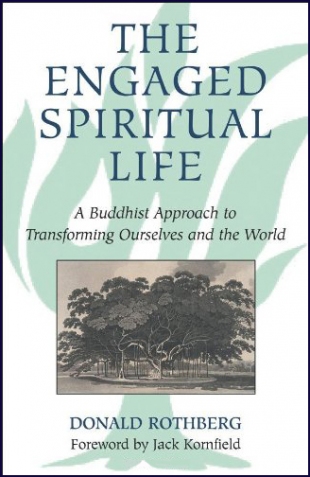Donald Rothberg is one of the major teachers and writers on socially engaged Buddhism in the United States. He is a meditation teacher on the Spirit Rock Center Teachers Council and has been an organizer and board member for the Buddhist Peace Fellowship. He believes that the time is ripe for a new synthesis of spiritual practice and social justice movements. Inner spiritual work is needed to bring out the best in us and service of others signals that we have taken seriously our obligations to the larger society and ecosystem.
The two paths of inner work and service of others "deeply need each other," he writes. "And our times desperately call for both spiritual and social commitments. Without spiritual development, well-meaning attempts to change the world will probably unconsciously replicate the very problems that we are solving. . . . We also run the risk of not having the kind of resources of wisdom, compassion, equanimity, and perseverance necessary to respond to the great needs of the times without being quickly burned out by anger and frustration. Outer transformation thus entails inner transformation."
With grace and persuasiveness, Rothberg shares spiritual practices that get to the core of our private and public realms of experience. Although the book is based on a Buddhist approach, there are plenty of references to other faiths and models for melding meditation and social action. The author elucidates ten principles that connect inner and outer transformation. They are: ethical practice, mindfulness in action, clarifying and setting intentions, opening to compassion, taking care of self, not knowing but keeping going, interdependence, transforming anger, acting with equanimity, committed action with non-attachment to outcome, and finding our individual directions through discerning our next steps.
This substantive guidebook weds theory and practice in a vital and memorable way. It is filled with colorful anecdotes and inspirational insights from the lives and writings of sturdy souls such as Mahatma Gandhi, Dr. Martin Luther King, Jr., Joanna Macy, Bernie Glassman, Thich Nhat Hanh, and many others.
Here is a practice suggested by Joseph Goldstein as one way to activate helpfulness, kindness, and appropriateness in speech: commit yourself not to speak about a third party for a week. People who try this notice how many times their talk about others is negative. Goldstein also found that not talking about a third person greatly diminished his communication altogether.
Rothberg's chapter on intentions is one of the best summaries of this important spiritual topic we've seen. Knowing the righteous indignation of many of our activist friends, we appreciated the quotation by Jim Forest: "Now I know why the peace movement exists. The purpose is to take the angriest people in the world and keep them out of the military." Since we can't resist a great quote, here is another by the African American theologian and preacher Howard Thurman. It nicely sums up how inner and outer transformation work in tandem:
"Don't ask yourself what the world needs. Ask yourself what makes you come alive, and go do that, because what the world needs is people who have come alive."
